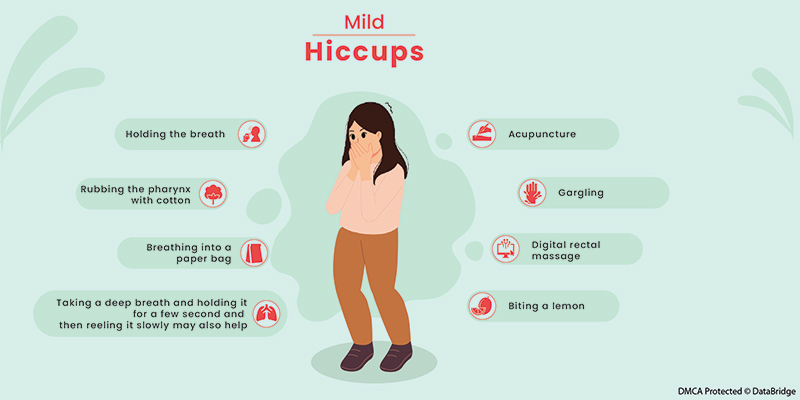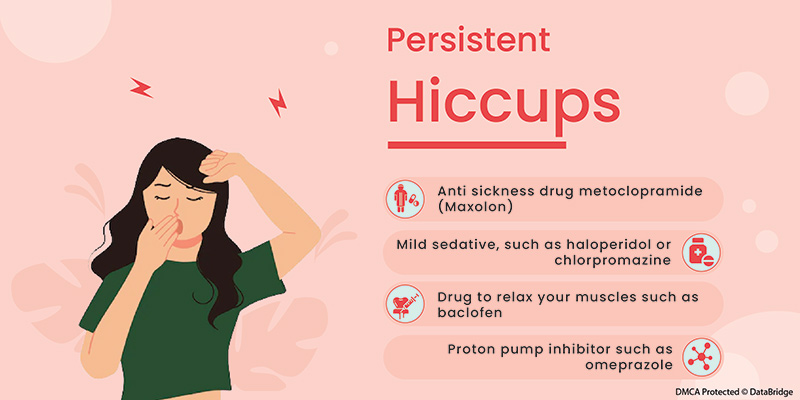Hiccups are an unpredictably common symptom witnessed in patients with cancer, either during cancer treatment or in the palliative care setting. Hiccups cause the characteristic sound because of involuntary clonic spasms of the diaphragm and intercostal muscles followed by the sudden closure of the glottis. In the majority of cases, hiccups are amusing and annoying, generally stopping within minutes. Some patients may experience prolonged hiccupping periods of greater than 48 hours (persistent or chronic) or over two months (intractable). Persistent or intractable hiccups have been stated in up to 10 % of patients with advanced cancer. Prolonged hiccups can have numerous undesirable consequences. These may include sleep disturbances, fatigue or exhaustion, reduced food and fluid intake, possible aspiration, emotional distress (anxiety and depression), and reduced cognitive function.
Our DBMR team has investigated the global anxiety disorder market and witnessed that Asia-Pacific has been witnessing positive growth for the global anxiety disorder market throughout the forecasted period due to rapidly improving healthcare infrastructure in the region. North America dominates the market due to increased investment by pharmaceutical industries for the advancement in the treatment and favorable reimbursement scenario.
To know more about the study, kindly visit: https://www.databridgemarketresearch.com/reports/global-anxiety-disorder-market
Possible Causes of Hiccups
Numerous conditions are thought to promote the development of persistent or intractable hiccups. These include gastric distention; GERD/gastritis; calcium and potassium; hyperglycemia; low blood levels of sodium, sudden change of temperature; alcohol intake; stroke; pneumonia; head injuries; brain tumors; pericardial and pleural effusions; and many more. Some cancers are associated with hiccups, including colon, lung, esophageal, pancreatic, liver, renal cancers, leukemias, and lymphomas.
Several medications have also been thought to be related to or cause persistent/intractable hiccups. Many of them are used in the treatment of cancer. Chemotherapy agents include cisplatin, etoposide, carboplatin, docetaxel, cyclophosphamide, paclitaxel, gemcitabine, vindesine, and vinorelbine. Cisplatin is found to be the most used chemotherapy agent in many of the case reports. Other non-chemo medications reported are corticosteroids, barbiturates, heroin, benzodiazepines, nicotine, methyldopa, antibiotics, and inhaled anesthesia. More invasive procedures include phrenic nerve block and vagal/phrenic nerve stimulation.
Of these medications, dexamethasone has been reported most frequently as a causative agent in persistent or intractable hiccups. Numerous case reports of patients who develop prolonged hiccups after chemotherapy administration, including dexamethasone. The patients in these reports often got relief by either substituting methylprednisolone or withholding the corticosteroid completely, without sacrificing antiemetic efficacy.
Treatment for Mild Hiccups
There are no permanent medical treatments for hiccups as these are temporary and get away easily without proper treatment. Numerous old and home remedies for hiccups are said to be very efficient but may not work well on patients with continuous hiccups.

Treatment for Persistent Hiccups
Several treatments are meant to treat persistent hiccups such as Chlorpromazine, a dimethylamine derivative of phenothiazine. It acts peripherally by dopamine antagonism in the hypothalamus. It is the only FDA-approved medication used for hiccups, and for many years it has been in use. As everything has pros and cons, this drug cannot be given to everyone and is not fruitful. It has adverse reactions such as confusion, tiredness, nausea, hypotension, urinary retention, and excessive sleep, even in a single dose.
Baclofen is also an effective drug used for people suffering from persistent hiccups and initiation of baclofen proved to be a favorable outcome for the persistent hiccup in 6 out of 10 patients and showed remarkable improvement in 2 patients. It is recommended to take an amount of 5gm-20gm of baclofen, three times a day. Another one is Gabapentin which also showed significant improvement, and the hiccups were relieved by oral Gabapentin. Baclofen is a gamma-aminobutyric acid (GABA) analog that activates an inhibitory neurotransmitter and is thought to help in blocking the hiccup stimulus. It is suggested to take 100 mg of Gabapentin three to four times a day. Furthermore, Nifedipine, a calcium channel blocker, may play a role in reversing the abnormal depolarization in the hiccup reflex arc. It has been stated to end persistent hiccups but tends to induce hypotension, which may be especially severe in volume-contracted patients or those receiving opioids. A daily dose of 30 to 60 mg of this drug significantly affected patients' hiccups and even stopped the hiccups in 24 hours.
There are many home remedies, such as deep and slow breathing into a paper bag, slowly drinking cold water, eating a teaspoon of granulated sugar, and holding your breath for as long as possible. Additionally, many caregivers who are supervising patients having problems with hiccups should watch the patient make sure they can drink adequate amounts of fluids. They should also check for dizziness when patients take medication for their hiccups, as they require help with standing or walking. The caregivers should also contact the concerned cancer team for the patient if they develop difficulty breathing, a bloated stomach, or if the hiccups last for longer than one day.

Acupuncture Treatment for Persistent Hiccups in Patients with Cancer
Acupuncture has long been used to treat hiccups in Asian countries, but in the U.S., only a single case report of the use of acupuncture for persistent hiccups in a patient without cancer has been found. In this article, we present a case series of acupuncture treatments for persistent hiccups in patients with cancer, with supporting data analysis. Furthermore, this is the first report of using an assessment instrument to measure hiccup severity. The mechanisms for acupuncture's efficacy in treating hiccups remain unclear. Most acupoints for hiccups are located near dermatomes associated with afferent/efferent pathways, secondary synapses, or nuclei involved in the hiccup reflex arc. Acupuncture might locally moderate any portion of the hiccup reflex arc by changing blood perfusion, activating the autonomic nervous system, regulating inflammatory mediators, or altering axonal excitability. It is also possible that acupuncture influences the hiccup center by modulating the secretion of neurotransmitters and neurohormones, such as endogenous opioids, norepinephrine, serotonin, substance P, and γ-aminobutyric acid.
The Acupuncture Consult Service is open to all NIH patients with various diseases and symptoms. A study titled, 'Acupuncture Treatment for Persistent Hiccups in Patients with Cancer" by Adeline X.Y et al. witnessed that there might be an association between persistent hiccups suffering from cancer and cancer-related procedures or therapies and that male patients are more vulnerable to persistent hiccups. The incidence of hiccups has a reported range of 30%–0.39% in patients with cancer undergoing chemotherapy with different drugs. The total prevalence was much higher in males than in females.
Our DBMR team has investigated the global chemotherapy drug market and witnessed North America dominating the market because of the presence of key product manufacturers and the rising geriatric population in this region. Moreover, high research and development expenditure and the presence of skilled professionals will further propel the market's growth rate in this region. Asia-Pacific is projected to grow during the forecast period due to increased government awareness programs and rising healthcare expenditure in this region.
To know more about the study, kindly visit: https://www.databridgemarketresearch.com/reports/global-chemotherapy-drug-market
Conclusion:
We all have hiccups from time to time. The exact cause of hiccups is unknown, but possible causes may include eating and drinking too quickly overeating, and alcohol. Hiccups generally go away on their own, but in some cases, treatments are suggested. If hiccups carry on for a long couple of days, they can be challenging. Hiccups are a significant complication of severe illness because of the effects of treatment medication. Hiccups can be a sign of serious illness. There are patients whose hiccup last more than 48 hours or the hiccups turn so bothering that they can cause problems with eating, sleeping, or breathing; in that case, immediate consultations is needed. Prolonged hiccups can result in depression, weight loss, fatigue, impaired sleep, malnutrition, aspiration syndromes, and dehydration. Pharmacotherapy can bring relief to persistent hiccup patients.









